

Peace Education Network » Teach Peace: Second Edition. About 4 RRR chapter3 0815. Cpclass. Art of Peace lesson plan 2. Lesson 1.2 Peace and Security Activities. MakingpeacewhereIlive. BOP word version module 1. Refugee Stories: Mapping a Crisis - The Choices Program. Lesson 4: Migration Flows. Unit 2: POPULATION AND MIGRATION - Team Harriet Southwest High School. Uiowa. Oxfam teaching controversial issues. Children' Parliament English. Hunger and Food Security Lesson. Teachers' Resources - World Population. 100 People: Through our Lens. 5-Minute Film Festival: Teaching Kids about Global Poverty. After the Thanksgiving week, which for many in America is symbolized by bounty, excess, and consumption of all stripes, I was struck by the value of seeing how people live in less wealthy parts of the world.
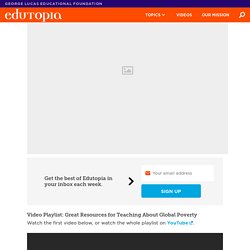
Living on One Dollar is a full-length documentary made by four college students who traveled to rural Guatemala to live on just a dollar a day. Upon their return, they created Living On One, a nonprofit to raise awareness and inspire action around global issues like hunger and poverty -- and started by publishing the Change Series of video shorts. 1 up rich. Income Inequality - Breaking News English Lesson - ESL Lesson Plan. KS2 BRAZIL L4 LessonPlan. Yr 12 13 unit 1.
Module d lesson 2. Lesson Plans for studying the Olympics. Olympics activities and lesson plan ideas. Introduction: The Olympic Games are a major international event of summer and winter sports, in which thousands of athletes compete in a wide variety of events.
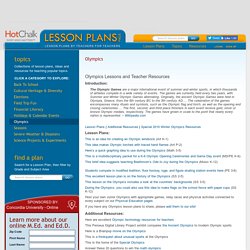
The games are currently held every two years, with Summer and Winter Olympic Games alternating. Originally, the ancient Olympic Games were held in Olympia, Greece, from the 8th century BC to the 5th century AD…. The celebration of the games encompasses many rituals and symbols, such as the Olympic flag and torch, as well as the opening and closing ceremonies…. The first, second, and third place finishers in each event receive gold, silver or bronze Olympic medals, respectively. NewYork 6 Olympics. Get connected migration lesson plan. Files/1bd8866d 9ac9 4e9e a997 212680dc47cf Teachers Toolikit sana25072018. Grade8 ScienceTechnology SystemsinAction.
Smart choices grades 4 6. Coursera. Smart choices grades 4 6. Exploring the Impacts of Feeding the World. Unit 2: Farmers, Factories and Food Chains - Lesson Plans - Food System Curriculum - Johns Hopkins University. This unit explores how our food—from plants to animal products to seafood—is grown, harvested, processed, and distributed.
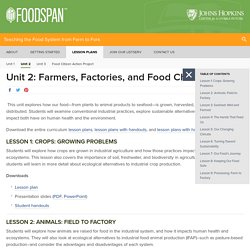
Students will examine conventional industrial practices, explore sustainable alternatives, and consider the impact both have on human health and the environment. Lesson Plan 3: How do farmers grow food around the world? Grade levels: 4 to 6.
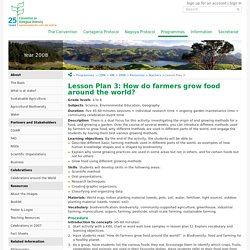
Subjects: Science, Environmental Education, Geography Duration: five 45-60 minutes sessions + individual research time + ongoing garden maintenance time + community celebration event time Description: There is a dual focus for this activity: investigating the origin of and growing methods for a food, and growing a garden. Over the course of several weeks, you can introduce different methods used by farmers to grow food, why different methods are used in different parts of the world, and engage the students by having them test various growing methods. SE08 AIE Final. Peaceful conflict resolution 0. Resolving Conflicts - Conflict Resolution - Lesson Plans - Elementary - Character Education.
If you are using the video, ask the first two questions before viewing. 1.
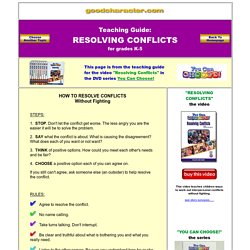
Have you ever seen a small disagreement turn into a big fight. What do you think made that happen? 2. Have you ever found yourself caught in the middle when other people couldn't agree? 3. 4. 5. 6. 7. Conflict resolution. Martha's True Stories : A Parent's Guide To Nonfiction. About Martha's True Stories Martha's True Stories is a great way to introduce your child not only to interactive books, but also what reading nonfiction offers: fun and intriguing information.
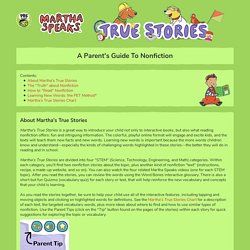
The colorful, playful online format will engage and excite kids, and the texts will teach them new facts and new words. Learning new words is important because the more words children know and understand—especially the kinds of challenging words highlighted in these stories—the better they will do in reading and in school. Martha's True Stories are divided into four "STEM" (Science, Technology, Engineering, and Math) categories. Within each category, you'll find two nonfiction stories about the topic, plus another kind of nonfiction "text" (instructions, recipe, a made-up website, and so on). Teaching about the Refugee Crisis and Making a Difference - I AM SYRIA. Teaching About the Syrian Refugee CrisisA zero-prep, Common Core-friendly, interactive lesson guide; made by teachers, for teachers; ready for class today!
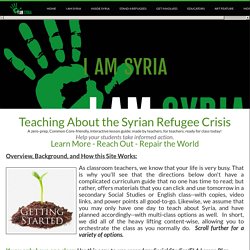
Teaching about the Syrian Refugee Crisis: Free Lesson Plans and Videos. After hearing about Syrian refugees on the news, my kids have been asking me more detailed questions.
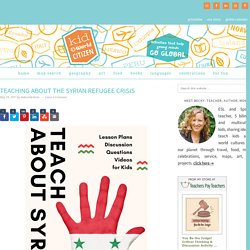
Why is there a war in Syria? Why are refugees leaving their country? What can we do to help? I put together this list of resources for teachers and parents who are interested in teaching about the Syrian refugee crisis, but don’t know where to start. Please add in any recommendations to the comments below! On a very basic level, that can be adapted depending on the kids’ ages, I tell kids that Syria is having a civil war. In 2011, some people were peacefully protesting their government, and soon the government punished them in a violent crackdown. The war in Syria has been going on for over 6 years, and at least 470,000 people have been killed. Refugee Stories: Mapping a Crisis - The Choices Program.
Connect to the World We Live In. Hide Caption JRA's Watershed Education by Student's program (WEBS) brings middle schoolers to a field day of learning hosted by high school science students who get a taste for teaching while explaining the workings of watersheds.
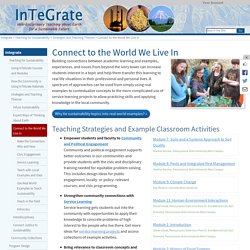
Provenance: Photo courtesy of James River Association and accessed via Flickr.com. Nguyen2 II 5. This lesson is called "What is Work?" Title – What is Work?
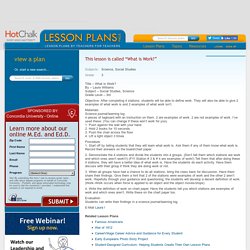
By – Laura Williams Subject – Social Studies, Science Grade Level – 3rd Objective: After completing 4 stations, students will be able to define work. They will also be able to give 2 examples of what work is and 2 examples of what work isn’t. Materials: Science journal/learning log 4 pieces of tagboard with an instruction on them. 2 are examples of work. 2 are not examples of work. Work Lesson Plan: All Subjects. Lesson Plan Mindmap for Work – Click to Enlarge This page is a free-shared lesson plan archive for teaching all educational subjects within the context and theme of “Work”. It is purposed for use in community education environments, homeschool environments, traditional schooling environments, or as a supplemental and fun addition to any education program. As part of the complete Education for Life Program, this lesson plan is specifically designed to work in conjunction with the other components: Foundations of Teaching, Curriculum, Teaching Strategies, Learning Tools and Toys, Evaluation Model, and The Ultimate Classroom.
If you’d like to learn how all these components work together, click here. Employ ks3 3. LessonPlan PreparingStudentsforJobsoftheFuture. WFTF lesson plan. Malone format. China From the Inside . Educators. For Educators Lesson Plan 1: Globalization In this Role Playing Debate classroom activity, students will gain a deeper understanding of the complexities of globalization by taking on the roles of people to debate the issues of globalization after watching a film clip from China from the Inside. Globalization101. Multinational Corporations: The Good, the Bad and the Ugly. Organizations as Global Education Resources: Global Curriculum. This webpage is a clearinghouse of non-profit organizations that offer global education resources, products, and services.
The purpose of the page is to provide resources to schools to develop their own global education programs in the area of global curriculum: American Forum for Global Education Lesson plans, teaching units, primary documents, book reviews, and publications.Website: www.globaled.org Website links to resources for educators.Website: www.afs.org. Resources for teachers, find teaching resources. WE. Working with the Community. Working with the Community This topic is about working with the community Being a Sustainable School means working closely with your local community.
A large number of communities across the UK have started their own movements to transition away from fossil fuels. Others have developed their own economic systems based on a local currency, such as the Brixton pound or Bristol pound. These topics can be introduced into the classroom as part of your pupils’ citizenship studies. Poverty Discussion Booklet. Family Histories - Inquiry at ISOCS.
006513. Ks3 sld reduce reuse recycle. Teens and the Elderly. Time Frame 1 class periods of 70 minutes each Summary This lesson encourages the students to get to know their grandparents a little better. They may be surprised on how much they actually have in common. The students will also be experiencing elderly life in several activities. Teens and the Elderly. World Vision International.
ECOSYSTEMS CHART teaching notes4. Ckla gk d11 anth. Creating a Culture of Peace PROJECT PEACEMAKERS primary. Today is the International Day of Peace. Road to peace web version 2. Right to education lesson plan new 2. Education Unit Plan. Migration. Get connected migration lesson plan. Get Connected: Migration Lesson Plan. Human Migration: Why Do People Move It, Move It? – Teacher-Created Lesson Plan.
The teacher will create a blank canvas in Padlet and share the link with students. Students will review their notes and add at least two new sticky notes with their name for the title to the Padlet canvas. (The name is important because it holds students accountable and allows you to identify the author for further discussion.) The teacher will call on students to read their responses individually. With the addition of each digital sticky note, the teacher will ask students if their notes are similar to others and if they can be grouped in any way.
As the class participates in this sharing and organizing, commonalities will emerge as migration is typically a result of political, economic, social, and natural events. If there are any gaps in what the students contributed, the teacher should ask questions to generate more input from the class and add the additional notes to the Padlet. Unit of Inquiry 6 - On The Move (Human Migration) - Grade 4-5. Countries I Know - Lesson plan. OC4plan. Full Lesson Plans FINAL. 4 respecting beliefs and opinions understanding beliefs and values. Got 12 culture. Beliefs Lesson Plan: All Subjects. Lesson Plan Mindmap for Beliefs – Click to Enlarge This page is a free-shared lesson plan archive for teaching all educational subjects within the context and theme of “Beliefs”. It is purposed for use in community education environments, homeschool environments, traditional schooling environments, or as a supplemental and fun addition to any education program.
As part of the complete Education for Life Program, this lesson plan is specifically designed to work in conjunction with the other components: Foundations of Teaching, Curriculum, Teaching Strategies, Learning Tools and Toys, Evaluation Model, and The Ultimate Classroom. If you’d like to learn how all these components work together, click here. Click here for the specifics focused on just using the lesson plans: Ms lesson 3. Personal dev. Sports & Leisure – ESL Library. Sports and Leisure Activities. Introduction to teaching road safety and lesson ideas. Fire Prevention Week Lesson Ideas for Grades 3-5. Safety Lesson Plans. Smart choices grade 3.
The first step to good health dt 101008. The first step to good health dt 101008. 5thGrade. All self regulation strategy cards. Assessment booklet 4 en. Peer relationships 1. Respectful Relationships Teaching Learning Package. C.1. Peer relationships 1. Peer relationships 1. Yr3 unit1.